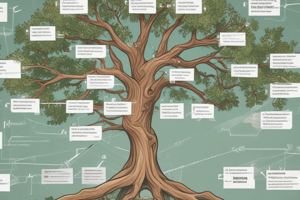Podcast
Questions and Answers
What is the primary function of the objective tree in project planning?
What is the primary function of the objective tree in project planning?
- To forecast project completion timelines
- To evaluate the skills of project personnel
- To identify financial resources for project execution
- To aid in the analysis and presentation of ideas/objectives (correct)
In the context of an objective tree, which element typically follows the 'Purpose' stage?
In the context of an objective tree, which element typically follows the 'Purpose' stage?
- Activities (correct)
- Causes
- Effects
- Goals/Overall Objectives
Which component of the objective tree corresponds to the intended results of a project?
Which component of the objective tree corresponds to the intended results of a project?
- Purpose
- Goals/Overall Objectives
- Results (correct)
- Effects
What does the problem tree primarily help to identify?
What does the problem tree primarily help to identify?
How are 'Causes' related to 'Activities' in the objective tree?
How are 'Causes' related to 'Activities' in the objective tree?
What type of information does a goal in the objective tree typically encompass?
What type of information does a goal in the objective tree typically encompass?
Which element in the objective tree outlines the specific actions required for project completion?
Which element in the objective tree outlines the specific actions required for project completion?
What is a key benefit of utilizing an objective tree in project planning?
What is a key benefit of utilizing an objective tree in project planning?
What is a key benefit of the bottom-up approach in project identification?
What is a key benefit of the bottom-up approach in project identification?
Which of the following is a limitation associated with the bottom-up approach?
Which of the following is a limitation associated with the bottom-up approach?
Participatory Appraisal (PRA) aims to achieve which of the following?
Participatory Appraisal (PRA) aims to achieve which of the following?
When formulating a problem statement in project identification, what is NOT typically included?
When formulating a problem statement in project identification, what is NOT typically included?
What does the screening process of projects help determine?
What does the screening process of projects help determine?
Which of these is a characteristic of the bottom-up approach?
Which of these is a characteristic of the bottom-up approach?
What is an aspect of effective resource management in the bottom-up approach?
What is an aspect of effective resource management in the bottom-up approach?
Which factor is NOT considered when screening projects for suitability?
Which factor is NOT considered when screening projects for suitability?
What is the primary purpose of a Logframe in project management?
What is the primary purpose of a Logframe in project management?
Which of the following elements is NOT typically included in a Logframe?
Which of the following elements is NOT typically included in a Logframe?
How does a Logframe clarify the components of a project?
How does a Logframe clarify the components of a project?
What does 'Means of Verification' refer to in a Logframe?
What does 'Means of Verification' refer to in a Logframe?
Why is it important to understand different terminologies used for Logframe elements?
Why is it important to understand different terminologies used for Logframe elements?
What is a crucial factor in ensuring the success of a project strategy?
What is a crucial factor in ensuring the success of a project strategy?
Which aspect is NOT typically included in a project proposal?
Which aspect is NOT typically included in a project proposal?
What is a SMART goal characteristic?
What is a SMART goal characteristic?
What is the primary purpose of conducting a strategy analysis in project planning?
What is the primary purpose of conducting a strategy analysis in project planning?
Which question is essential to evaluate the sustainability of a project?
Which question is essential to evaluate the sustainability of a project?
What does a project strategy contribute to?
What does a project strategy contribute to?
In project planning, what is a potential negative effect that must be assessed?
In project planning, what is a potential negative effect that must be assessed?
Which entity's commitment is vital for project success?
Which entity's commitment is vital for project success?
What is the overall objective for Project 1 concerning the quality of river water?
What is the overall objective for Project 1 concerning the quality of river water?
Which indicator is used to measure the overall objective in Project 1?
Which indicator is used to measure the overall objective in Project 1?
What method of verification is used for the overall objective in Project 1?
What method of verification is used for the overall objective in Project 1?
What is one of the assumptions regarding the purpose of improved river water quality?
What is one of the assumptions regarding the purpose of improved river water quality?
Which target group is mentioned as particularly at risk due to water quality in Project 1?
Which target group is mentioned as particularly at risk due to water quality in Project 1?
By what year does Project 1 aim to reduce the incidence of water borne diseases by 50%?
By what year does Project 1 aim to reduce the incidence of water borne diseases by 50%?
What is one of the benefits of improving river water quality as stated in Project 1?
What is one of the benefits of improving river water quality as stated in Project 1?
What specific heavy metal compounds are targeted for reduction in Project 1?
What specific heavy metal compounds are targeted for reduction in Project 1?
Flashcards are hidden until you start studying
Study Notes
Objective Tree
- Used to analyze and present ideas/objectives
- Provides a simplified but robust summary of reality
- Used to keep project objectives firmly based on addressing a range of clearly identified priority problems
What Is a Problem Tree?
- Central to project planning
- Helps people work as a team
- Makes projects sustainable
- Improves resource management
- Reduces dependence
- Increases equity, initiative, accountability, and financial discipline
Limitations of Bottom-Up Approach
- Not always effective for projects requiring urgency
- Time-consuming
- May not fit with national or international priorities
Bottom-Up Approaches to Project Identification
- Facilitation/Community Action – Helping individuals get over problems by training them, providing information, or linking them with relevant agencies.
- Participatory Appraisal (PRA) – Encouraging local communities to identify and prioritize their needs.
The Problem Statement
- Listing problems/needs in a community/area/organization.
- Prioritizing problems.
- Finding the root causes of the problems.
- Identifying the likely effects of the problems.
- Suggesting probable solutions to the problems.
- Identifying the potential projects from the solutions.
The Screening Process of Projects
- Is the technology appropriate to the local capabilities?
- Is the risk manageable?
- Is there adequate demand for the expected outputs?
- Will the supply of raw materials or skills be adequate?
- Is the design in agreement with existing institutional capabilities?
- Will the recurrent costs be adequately met by available resources?
The Screening Process of Projects Continued
- Is there commitment to the project by the intended beneficiaries?
- Is there adequate support from local, city, district, and national government authorities?
- Are there negative environmental effects, and can they be mitigated?
- Is the project culturally acceptable?
- Is the project sustainable?
Project Proposal Elements
- Title
- Background, context, and area characteristics
- Description
- Beneficiaries
- Objectives
- Justification
- Outputs
- Activities
- Inputs
- Budget
- Organization and management
- Monitoring and evaluation
- Sustainability plans
Project Strategy and Goal
- “A strategy is a broad approach that has to be followed to achieve a goal.”
- “Project strategy is a direction in a project that contributes to success of the project in its environment.”
Logframe
- Organizes a large amount of information in a coherent and concise manner.
- Used in the formulation, implementation, monitoring, and evaluation of projects.
- Combines various components, like overall objective/goal/impact, purpose/outcome, results/outputs, activities, indicators, means of verification, and assumptions.
Logframe Horizontal Logic
- Measures the effects of and resources used by a project through the specification of key indicators of measurement (OVI) and the means by which the measurement will be verified (MoV).
Different Terminologies Used for Elements of Logframe
- Different organizations use different terminologies, but the placement of these terms in relation to levels of objective in the Logframe is the same.
Logframe Example 1
- “Improve the quality of river water”
- Overall Objective: To contribute to improved family health, particularly the under 5s, and to improve the general health of the riverine eco-system.
Logframe Example 1 Continued
- Project Summary: To contribute to improved family health, particularly the under 5s, and to improve the general health of the riverine eco-system.
- Indicators: Incidence of waterborne diseases, skin infections, and blood disorders caused by heavy metals, reduced by 50% by 2025, specifically among low-income families living along the river.
- MoV: Municipal hospital and clinic records, including maternal and child health records collected by project teams.
- Assumptions: Public awareness of the health risks associated with heavy metal pollution.
Logframe Example 1 Continued
- Purpose/Outcome: Improved quality of river water.
- Indicators: Concentrations of heavy metal compounds (Pb, etc) in river water.
- MoV: Monthly water quality surveys jointly conducted by the project team.
- Assumptions: The project team will be able to access the river periodically for testing.
- Results: Reduction in the incidence of waterborne diseases.
- Activities: Training on safe water treatment, conducting community awareness campaigns, etc.
Studying That Suits You
Use AI to generate personalized quizzes and flashcards to suit your learning preferences.




